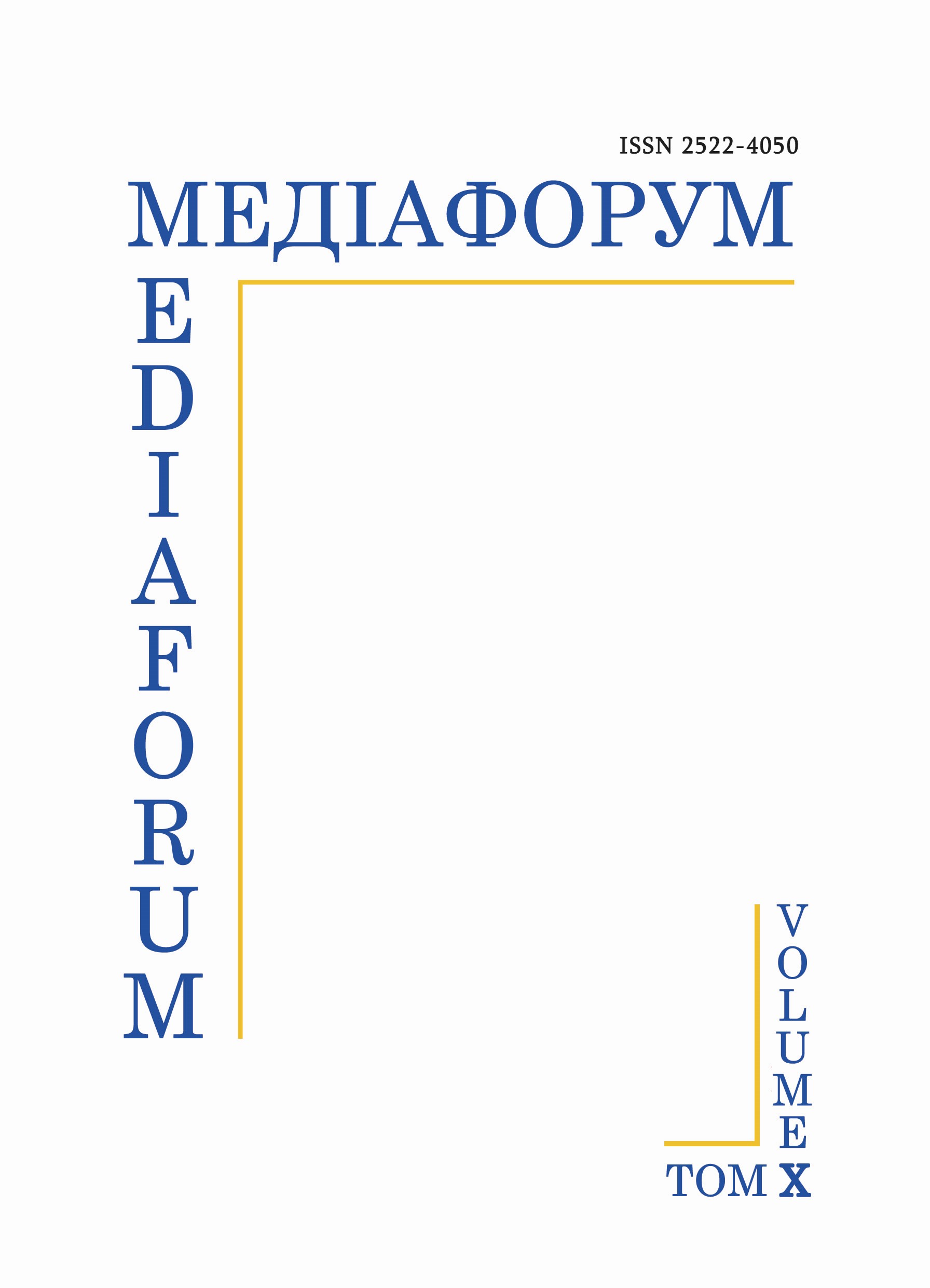Institutionalization of the Policy of Counteracting Disinformation in the European Union
DOI:
https://doi.org/10.31861/mediaforum.2022.10.196-208Keywords:
information space, disinformation, media, facework, monitoring, facts, social networkAbstract
The article analyzes the institutional processes of ensuring the counteraction to the disinformation influences of the Russian Federation in the European Union, starting from the beginning of the Crimea anexia in 2014. The information space of the EU countries is vulnerable, as the information component in democratic states is critical for functioning of the political system and adequate communication between society and the authorities.
Having analyzed the institutional mechanisms and normative documents of the EU, as well as the reaction to the disinformation campaigns of certain countries, the EU has gradually formed intergovernmental institutions to combat disinformation. We note that the responsible civil position of social networks, providers and electronic media contributes to the fight against disinformation expressed in joint resolutions and acts of self-censorship and thorough check of news, advertisers. Public activists, experts and journalists on volunteer basis have created a backbone of the tools to counter disinformation, which confirms the advantages of democratic civil society.
Downloads
References
Deutsche Welle. 2015. Lithuania to ban Russian TV channel for ‘warmongering’. https://www.dw.com/en/lithuania-to-ban-russian-tv-channel-for-warmongering/a-18370852;
DISINFO REVIEW. 2022. Disinformation at the border of war. https://euvsdisinfo.eu/disinfo-review/
European Commission. 2016. Media Pluralism and Democracy: Outcomes of the 2016 Annual Colloquium on Fundamental Rights.https://ec.europa.eu/information_society/newsroom/image/document/2016-50/2016-fundamental-colloquium-conclusions_40602.pdf;
European Commission. 2016. Regulation 2016/679 of the European Parliament and of the Council of 27 April 2016 on the Protection of Natural Persons with Regard to the Processing of Personal Data and on the Free Movement of Such Data, and Repealing Directive 95/46/EC.https://eur-lex.europa.eu/legalcontent/EN/TXT/PDF/?uri=CELEX:52020XC0417(08)&from=EN;
European Commission. 2018. Communication From the Commission to the European Parliament, the Council, the European Economic and Social Committee and the Committee of the Regions. Tackling Online Disinformation: a European Approach. Brussels, 26.4.2018. COM/2018/236 final. https://eur-lex.europa.eu/legal-content/EN/TXT/PDF/?uri=CELEX: 52018DC0236 &from =EN
European Commission. 2018. Lithuania’s decision to suspend broadcast of the Russian language channel “RTR Planeta” complies with EU rules. News, https://ec.europa.eu/digital-single-market/en/news/lithuanias-decision-suspend-broadcast-russian-language-channel-rtr-planeta-complies-eu-rules;
European Commission. 2018. Synopsis Report of the Public Consultation on Fake News and Online Disinformation. https://ec.europa.eu/digital-single-market/en/news/synopsis-report-public-consultation-fake-news-and-onlinedisinformation;
European Commission. 2022. Code of Practice on Disinformation. https://digital-strategy.ec.europa.eu/en/policies/code-practice-disinformation;
European External Action Service (EEAS). 2021. Questions and Answers about the East StratCom Task Force. https://eeas.europa.eu/ headquarters/headquarters-homepage/2116/-questions-and-answers-about-the-east-;
European Parliament. 2014–2019. Online platforms and the Digital Single Market European Parliament resolution of 15 June 2017 on online platforms and the digital single market. https://www.europarl.europa.eu /doceo/document/TA-8-2017-0272_EN.pdf?redirect;
European Parliament. 2015. Resolution of 10 June 2015 on the state of EU-Russia relations. https://www.europarl.europa.eu/doceo/document/TA-8-2015-0225_EN.html?redirect;
France 24. 2017. Macron slams RT, Sputnik news as ‘lying propaganda’ at Putin press conference. https://www.france24.com/en/20170530-macron-rt-sputnik-lying-propaganda-putin-versailles-russia-france-election;
The International Foundation for Electoral Systems(IFES). 2020. REGIONAL EUROPE OFFICE HOLDS SUCCESSFUL FIRST VIRTUAL EVENT IN LIGHT OF PANDEMIC. https://www.ifes.org/news/regional-europe-office-holds-successful-first-virtual-event-light-pandemic;
The UN Special Rapporteur on Freedom of Opinion and Expression, the OSCE Representative on Freedom of the Media, OAS Special Rapporteur on Freedom of Expression and the ACHPR Special Rapporteur on Freedom of Expression and Access to Information. 3 March 2017. Joint Declaration on Freedom of Expression and “Fake News”, Disinformation and Propaganda. FOM.GAL. https://www.osce.org/files/f/documents/6/8/302796.pdf;
Waterson, Jim. 2019. RT fined £200,000 for breaching impartiality rules. The Guardian (26 Jul 2019) https://www.theguardian.com/media/2019/jul/26/rt-fined-breaching-impartiality-rules-ofcom;
Rotar, Nataliia. 2021. «Formuvannia polityky zakhystu elektoralnoi modeli politychnoi uchasti vid dezinformatsiinykh vplyviv (na prykladi polityky Yevropeiskoho Soiuzu)». Istoryko-politychni problemy suchasnoho svitu, vyp. 43 (Cherven):179-93. https://doi.org/10.31861/mhpi2021.43.179-193.














